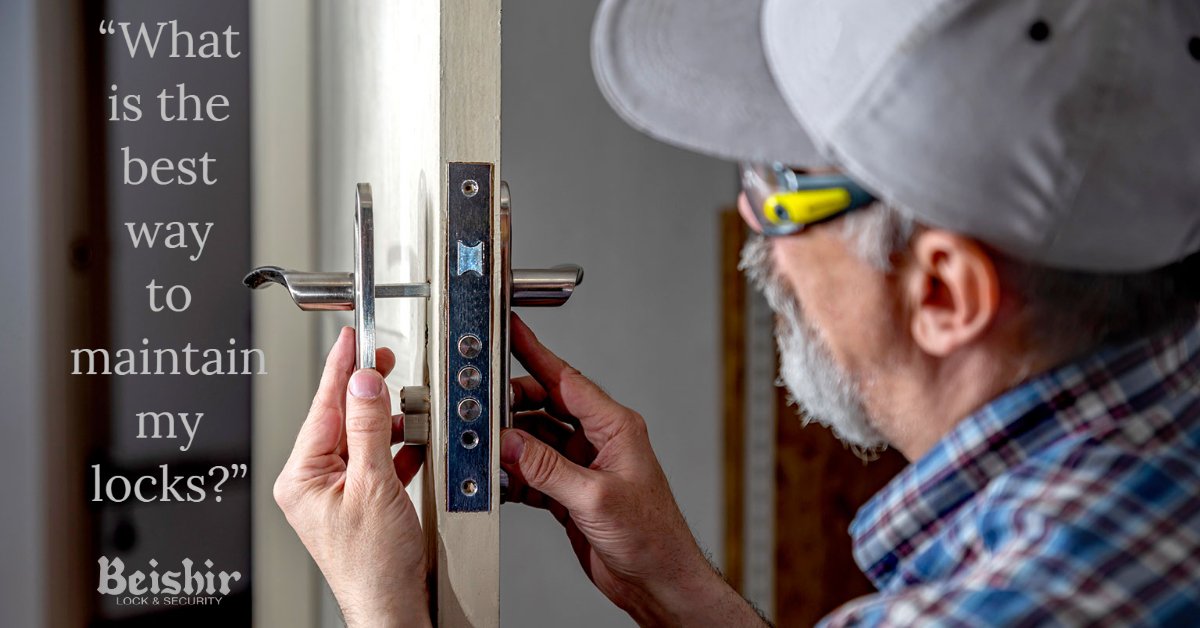What Is the Best Way To Maintain My Locks?
What is the easiest form of lock maintenance?
The simplest method of lock maintenance is to not use it when not needed. Every time the lock is used, metal is grinding on metal, causing wear. Eventually these locks will wear out.
Why do locks break? Besides the normal wear and tear from daily use, locks will break from being overly stressed and poorly maintained. Sometimes locks will get jammed from being forced, or when shards or debris gets caught in them. With lock maintenance, you can reduce breakage and keep your locks functioning properly.
What type of lock maintenance works for outdoor locks?
Outdoor locks will experience more opportunities for damage as they are exposed to weather and moisture. These locks should undergo lock maintenance specific to the most severe elements they are exposed to. A general maintenance measure is gently oiling the lock, preventing rust and ice accumulation. In most cases, you want to address particular issues as they worsen but before they cause lasting damage. In addition, you should check the locks that you do not often use and oil them on a schedule to make sure that they stay in good working order.
Th most important thing to remember if locks are frozen is to NOT pour hot water on them! While this will melt the ice, it also introduces more moisture to the lock and adds to the likelihood of more and worse freezing later. If you have to thaw the lock quickly you can do so with isopropyl alcohol, which you likely have in the form of rubbing alcohol or hand sanitizer, but it is best to prevent freezing through lock maintenance than deal with the emergency thaw.
Also, be aware that the more a lock freezes and thaws, the higher the chance rust will form. This is especially bad if the lock is freezing inside, meaning the internal components are going to rust. Internal rust is extremely difficult to remove and will often lead to the need for replacement locks.
Basic Maintenance: Realign Lock
When your lock is not opening or locking smoothly, there is likely an issue with the alignment of your latch bolt and/or your strike plate. In this instance, you will need a realignment. This will also help keep your door secure. When a like is not aligned properly it will need more force to close and lock. That additional force will eventually cause damage to the lock that will have to be fixed or replaced. The simple solution is ito raise the strike plate or adjust the hole in the door frame to allow the lock to position correctly in it. When doing this, it is important to make sure that screw holes are far enough apart from the old ones to not cause the frame to be flimsy or unreliable. If there is a doubt about the integrity of your door frame, you should definitely contact a professional because this is the security of your home, and you should not take chances! If it is not possible to keep the integrity of the door by redrilling the holes, you can also widen the strike hole on the door frame, allowing the lock to sit correctly in the frame.
Adjusting the Door
When your door sticks it can cause the same problems as a misaligned lock. The lock will not want to slide into place if the door is not situated correctly. Wood can expand as the weather changes and this can cause doors and frames to become mishapen. When this happens, it makes your door lock not fit correctly. The first thing to do in this case is open and close the door to see the point where it is catching. Once you find the problematic side, mark with a pencil how much material is in the way. Then you can remove the door and shave it down to the right size.
Clean the Lock
Are you dealing with a clean lock? In some cases, dust and debris can clog the internal components of a door lock and keep the device from working properly. This may be a case of built-up debris in the key area or in the crevices of the bolt, the latch area, or even deeper in the lock. If your key is sticking in the lock it may be that there is debris in the lock chamber that needs to be cleaned out. The best way to clean out a door lock is just about using the right kind of lubricant. Spray the lubricant in the lock and turn the key several times to make sure that it gets in all of the nooks and crannies. If there is something stuck beyond where lubrication is effective, taking the lock apart to clear the debris may be the most effective way to clean it.
Remove Rust
When most people think of lock maintenance, they are probably thinking about removing rust. You can treat and prevent rust with lock maintenance, but the method that will work best will depend on how much rust you are dealing with. A little bit of rust can be removed with an oil-based lubricant such as WD-40. Apply the spray and rub the rust away. Be sure to use the lubricant sparingly, as it can attract dust and dirt that can block the lock. If there is too much rust, try a mux of vinegar and water. When there is too much rust, it may be necessary to replace the lock.
Replace Trouble Keys
An ill-fitting key can harm your lock with repeated use. Worn keys do not work properly, which causes you to wiggle or jiggle the key. This adds unnecessary stress to the lock and can lead to both the key and lock breaking. To determine if your key is the problem with your lock, the best thing to do is to feel the teeth of the key. If they are smooth, or rounded you will kow that they are worn down and likely need a new key. A fresh key will have rough, jagged edges. It may be time for a freshen up on your key to keep your locks working smoothly.
So, the best way to maintain your locks is reduce the stress on them. In properly maintaining your locks, you can increase its lifespan and the security they offer. Do your best to make sure that ice and rust do not accumulate on your locks and don’t ignore them when the keys get harder to turn. If the door is sticking, adjust it. If the lock is hard to turn, adjust it. If you address the issues as they arise, you may be able to catch it when it is a minor inconvenience before it turns into a serious security risk or expense. For any assistance with your lock maintenance, contact us. Your locks are where your security and protection start but they are also a device you use every day. Make that experience as stress-free as possible with better lock maintenance.






